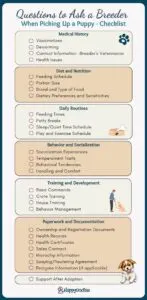The day you bring your new puppy home is an exciting time. It’s a day filled with joy as you welcome a new family member. However, it’s also a day for important questions. Knowing the right questions to ask a breeder when picking up a puppy is crucial.
But before we get into the questions, let’s take a step back. At this point it’s assumed that you took your time to identify a specific breed that best fits your lifestyle, whether it is one of the many purebred dogs or a popular mixed breed. It is also assumed that you found a responsible breeder that (unlike puppy mills) values a healthy puppy over profits. This includes conducting health tests on the puppy’s parents to screen for genetic diseases. You may have already picked the right puppy for you and now all that is left to do is bring them home.
Preparing for a Smooth transition
In preparing for your puppy’s smooth transition, certain questions are key. For example, asking about the puppy’s health history is vital as it helps you continue their care without interruption. While understanding their daily routine, like feeding and sleeping schedules, helps maintain consistency in their routine, easing their transition into your home.
This guide will provide you with many of the important questions to ask a reputable breeder, helping you feel prepared and confident as you start caring for your new furry friend from day one. But remember, every one’s situation is unique and might require different considerations.

30 Questions To Ask A Breeder When Picking Up A Puppy
Medical History
When you pick up your new puppy, it’s important to ask the breeder questions about the puppy’s health history. Specifically ask them about:
- Vaccinations: Find out which ones your puppy has had and when they are due for their next shots. Making sure your puppy has all their necessary vaccines helps to ensure they do not end up with a serious health problem that could have been avoided.
- Deworming: Deworming is a routine and essential practice for puppies to remove internal parasites like roundworms, hookworms, and tapeworms. Puppies are prone to these infestations, which can lead to nutritional deficiencies, gastrointestinal issues, and pose a risk to human health. It’s normal to deworm puppies starting from a few weeks of age, with subsequent treatments as advised by a veterinarian.
- Contact information: Request contact details of the veterinarian who has looked after the puppy. That way, you can reach out to them directly if you have more questions later.
- Health Issues: Ask about any health issues or treatments the puppy has had. Knowing the full medical history helps you take better care of your new dog.

Diet and Nutrition
When bringing a new puppy into your home, understanding their feeding schedule and diet is a key aspect for their health and comfort. Here are some topics to cover:
- Feeding Schedule: Puppies typically require more frequent feeding than adult dogs. Ask the breeder about how often the puppy is currently being fed. This information will help you maintain consistency in the puppy’s routine, which can ease its transition into your home.
- Portion Sizes: Find out the specific amount of food given per meal. Proper portion sizes are crucial to prevent overfeeding or underfeeding, which can lead to health issues. Just remember, as your puppy grows you will need to increase their portion size. Talk to your vet for advice on a feeding schedule and portion sizes as your puppy grows.
- Brand and Type of Food: Identify the brand and type of food (like puppy formula, dry kibble, or wet food) the puppy is accustomed to. Many breeders will supply you with a few day’s worth of food to get you started. If you choose to switch what they are eating, avoid a sudden change in their food. Instead do it gradually by mixing their current food with the new one to avoid digestive problems.
- Dietary Preferences and Sensitivities: Ask the breeder if the puppy has shown any preferences or sensitivities towards certain types of food or ingredients. This can include reactions like allergies or digestive issues. Knowing this in advance can help you choose the most suitable food and avoid potential health problems.

Routines
Understanding a puppy’s daily routine will contribute to a smooth transition into their new home. Here’s are some questions to ask a breeder to help you understand their current routine:
- Feeding Times: Find out the specific times the puppy is accustomed to eating. Puppies usually eat three to four times a day, and sticking to these times helps maintain their dietary routine.
- Potty Breaks: Puppies require regular bathroom breaks as part of their house training. Inquire about the frequency of these breaks and also where the puppy has been trained to relieve themselves, whether at an outdoor potty area, on training pads or a litter box.
- Sleep Schedule: Puppies need plenty of sleep. Inquire about their typical sleeping times, including how they fare overnight. But it is important to recognize that once puppies arrive in their new homes they will no longer have their mom and litter mates to sleep with so they may have a harder time sleeping.
- Play and Exercise: Ask the breeder questions about how much play and exercise the puppy is used to. Regular physical activity is important for their development and well-being.
- Quiet Time: Learn when the puppy usually has its quiet or downtime. This helps in balancing active play with necessary rest, crucial for a puppy’s overall health and behavior.

Behavior and Socialization
Ask the breeder questions about the puppy’s socialization experiences and any observed behaviors or temperament traits.
- Socialization Experiences: Ask the breeder questions about the various socialization experiences the puppy has had. This includes interaction with different people, other animals, exposure to various environments, and sounds. Proper socialization is important for developing a puppy’s behavior and temperament.
- Temperament Traits: Inquire about the puppy’s observed temperament traits. Is the puppy bold or shy? Do they have a high energy level? How do they react to new experiences or challenges? Understanding these traits can guide how you continue their socialization and training.
- Behavioral Tendencies: Ask about any specific behavioral tendencies or quirks the puppy may have shown. This could include anything from a preference for certain toys to responses in specific situations.
- Handling and Comfort: Understanding how the puppy has been handled (like grooming, bathing, or vet visits) can provide insights into how it might react to such activities in your care.

Training and Development
You’ll want to ask whether the breeder has started any training with your puppy. This includes basic commands, crate training, and socialization. Knowing this helps a lot as you start to train your puppy. Specifically ask about:
- Basic Commands: Find out if the puppy has been introduced to any basic commands such as ‘sit’, ‘stay’, ‘come’, or ‘heel’. Also, inquire about any specific techniques they found effective with training your puppy.
- Crate Training: Ask if the puppy has started crate training. Crate training is important for house training and providing the puppy with a safe, comfortable space. Knowing the puppy’s comfort level with the crate will help you in furthering this training or starting it if necessary.
- House Training: Check on the puppy’s progress with potty training. Knowing its current stage will help you continue this training more effectively and set realistic expectations.
- Behavior Management: Discuss strategies for managing common puppy behaviors, such as biting, chewing or barking. The breeder’s experience can offer valuable insights into effective management techniques.

Paperwork and Documentation
When picking up your new puppy, it’s essential to obtain and understand various paperwork and documentation from the breeder. Here are key documents and information you should ask for:
- Ownership and Registration Documents: If your puppy is an American Kennel Club registered breed, ensure you receive official registration papers. This documents the puppy’s breed and lineage and may be necessary if you plan to show or breed your dog in the future.
- Health Records: Request a complete set of medical records for the puppy, including a record of vaccinations, deworming, and any other medical treatments they have received. Additionally, request copies of the results for any health tests conducted on the breeding dogs for hereditary conditions. Having these records is vital for ongoing health care and will be valuable information for your veterinarian.
- Health Certificates: A good breeder should supply a health certificate from a licensed veterinarian. This certificate should confirm that the puppy is in good health at the time of pickup
- Sales Contract: A puppy contract or agreement should outline the terms of sale, including the price, the breeder’s health guarantee, and any return policy. This legally binding document protects both you and the breeder.
- Microchip Information: If the puppy has been microchipped, ensure you get the microchip number and information on how to update your contact details in the microchip registry. This is important for the safety and identification of your puppy.
- Spaying/Neutering Agreements: Some breeders require a spay/neuter agreement, especially if the puppy is sold as a pet and not for breeding. Clarify any such conditions or agreements.
- Pedigree Information: For purebred puppies, a pedigree dog chart detailing the puppy’s family tree can be important. It gives information about the puppy’s ancestors and can be a testament to its lineage and potential traits.
- Breeder’s Recommendations and Instructions: Often, breeders provide a packet of information to new owners including care instructions, feeding guidelines, and recommendations for initial care and training. This can be very helpful as you acclimate your puppy to its new home.

30. Support After Adoption
Ask the breeder if they are open to future communication. It’s important to have the option to contact them for any questions or concerns that might arise after you bring your puppy home. This can include queries about the puppy’s health, behavior, or general care.
Tips for a Smooth Transition
Travel Tips
When you’re ready to bring your new puppy home, it’s important to plan for a safe and comfortable journey, as well as to prepare for the puppy’s first day in its new environment.
- Safe Transport: If you’re traveling by car, use a well-ventilated crate or carrier. This keeps the puppy secure and reduces the risk of motion sickness. Make sure the crate is secured to avoid movement during the drive.
- Comfort Measures: Bring along a blanket or a toy from the puppy’s previous home to provide a sense of familiarity and comfort. Also, have water available, especially for longer trips.
- Frequent Stops: For long journeys, plan for regular stops to let the puppy stretch, relieve itself, and drink water and maybe eat. This helps reduce stress and keeps the puppy comfortable.
- Temperature Control: Ensure the vehicle’s temperature is comfortable for the puppy, avoiding extreme heat or cold.

First Day at Home
- Quiet Environment: Keep the environment calm and quiet on the first day. Too much excitement can be overwhelming for a puppy.
- Safe Space: Set up a designated area for the puppy with its bed, food and water bowls, and toys. This helps the puppy feel secure and understand where their personal space is.
- Gentle Introduction: Gradually introduce the puppy to other family members and pets. Monitor these interactions to ensure they are positive and not too stressful.
- Routine Establishment: Start establishing a routine for feeding, potty breaks, and bedtime. Consistency helps the puppy adjust quicker.
- Supervision and Comfort: Spend time with the puppy, offering comfort and supervision as it explores its new surroundings. This helps in building trust and a sense of security.
As a recap, it’s a good idea to have a list of questions on hand when you go to pick up your new puppy. That’s why, along with this post, we’ve provided a free question checklist. It’s packed with all the important things you’ll want to ask to make sure your puppy settles in comfortably to their new home. From their health details to what their day looks like, these questions are your key to a smooth start.
So, grab that checklist, get ready with your questions, and get set for all the fun and love your new puppy is going to bring into your life!

